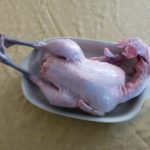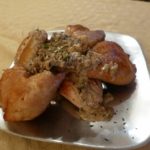 If you’ve eaten chicken at Coho, chances are it was a “Cornish Hen” raised by Bernie Nash of Mad Hatcher Poultry in Ephrata, Washington. Averaging 2 1/2 – 3 pounds, Bernie’s Cornish Hens look more like a traditional chicken than the single serving whole birds sold by the same namesake. Bernie’s chickens, as we like to refer to them, are absolutely delicious. They can be grilled, pan roasted and baked and always seem to maintain their wonderful moist texture and flavor without brining. As it turns out, most chickens we eat in this country – 99%, in fact – are what’s called Cornish crosses, birds designed to get fat as quickly and efficiently as possible. They’re ready to be butchered in just over a month – even if they’re free range and organic.
If you’ve eaten chicken at Coho, chances are it was a “Cornish Hen” raised by Bernie Nash of Mad Hatcher Poultry in Ephrata, Washington. Averaging 2 1/2 – 3 pounds, Bernie’s Cornish Hens look more like a traditional chicken than the single serving whole birds sold by the same namesake. Bernie’s chickens, as we like to refer to them, are absolutely delicious. They can be grilled, pan roasted and baked and always seem to maintain their wonderful moist texture and flavor without brining. As it turns out, most chickens we eat in this country – 99%, in fact – are what’s called Cornish crosses, birds designed to get fat as quickly and efficiently as possible. They’re ready to be butchered in just over a month – even if they’re free range and organic.
Bernie and his partner, Riley Starks, are trying to bring back a slower-raised chicken – approximately 17 weeks from start to finish. The meat from these birds has more complexity because so much time and special care is put into raising them. Nash and Stark are importing a flock of Canadian poulet blue chickens from British Columbia, currently impossible to find in America. It’s been almost two decades coming, carefully breeding the flock of chickens to closely resemble the famous Poulet de Bresse from Burgundy, France. And yes, these blue-footed chickens do have blue feet.

You can learn more about their project at their website. If successful, Nash and Starks will have the exclusive rights to raise these chickens in the United States. Bernie is a good friend of ours – lucky us! – so we will be showcasing the birds in upcoming special dinners at Coho. In addition to the Cornish breed, we get our Thanksgiving Turkeys, squab for special event dinners and of course eggs from Mad Hatcher Poultry as well.
Always striving for the most authentic experience, we wanted to see and taste for ourselves what all the hype was about. Anna Maria and Dave, Coho’s owners, recently acquired one of these birds and decided to cook it up. When Bernie’s operation is up and going the blue chickens will be delivered fresh each week. This sample bird was frozen, so after four days in the refrigerator, it was showtime.
Anna Maria researched authentic French recipes, which ran the gamut of slow cooking in a terrine to stove top cooking with a rich cream sauce. Sweet potatoes were also a typical accompaniment. We opted for the latter, and added some wild mushrooms to the sauce to complement the rich meat we were anticipating. After we unwrapped the bird, we noticed immediately how anatomically different this was to the typical Cornish cross. This bird has a longer leaner breast and skeletal structure, and of course, traditional blue feet. The head and comb were still attached to the neck. It reminded me of the chickens you see hanging in butcher shops in Europe and international markets. We broke down the chicken, careful to save the back, head and feet for stock. Since the meat has a rich marbled texture, the stock is similarly rich, and jiggles like Jello-O. We didn’t see any of the fat globules on the edge of the meat that you would normally see on a traditional Cornish Cross. The legs had a lovely brown color, as compared to the pink color of the breast white meat.
 The skillet was heating as we were finishing the last of the butchering. I used Camelina Gold oil, produced from a small family farm in Eastern Washington, for pan-searing the bird. Camelina oil can be traced back to the Bronze Age. It is pressed from a plant belonging to the Brassica family, and is sometimes called false flax, German sesame, gold-of-pleasure, linseed dodder, Siberian oilseed, and wild flax. Bernie uses the byproduct of the oil pressing to feed his chickens as it is a non-GMO, non-soy based food. Camelina oil is a forgotten oilseed crop, as margarine cannot be easily made from it. It has all the good omega-3 fatty acids and related health benefits, but it is an excellent cooking oil due to its high smoke point – perfect for searing the bird. The Camelina is rich, green and thick with a fresh grassy taste.
The skillet was heating as we were finishing the last of the butchering. I used Camelina Gold oil, produced from a small family farm in Eastern Washington, for pan-searing the bird. Camelina oil can be traced back to the Bronze Age. It is pressed from a plant belonging to the Brassica family, and is sometimes called false flax, German sesame, gold-of-pleasure, linseed dodder, Siberian oilseed, and wild flax. Bernie uses the byproduct of the oil pressing to feed his chickens as it is a non-GMO, non-soy based food. Camelina oil is a forgotten oilseed crop, as margarine cannot be easily made from it. It has all the good omega-3 fatty acids and related health benefits, but it is an excellent cooking oil due to its high smoke point – perfect for searing the bird. The Camelina is rich, green and thick with a fresh grassy taste.
The bird crisped up nicely in the pan and once we had an even sear on both sides, we finished off the legs and the breast in the oven.
In the meantime, I prepared the sauce. I was hoping there would have been more particulates left from the chicken to use for the

sauce. Nevertheless, we added the shallots and mushrooms to the same pan and caramelized them for the base of the sauce. I added white wine and reduced, and finished off with some farm fresh cream and some freshly chopped thyme and rosemary, with a bit of salt and pepper to taste.
We plated the chicken and added this rich earthy sauce. The breast meat had a more defined texture, similar to a turkey but more delicate, without being mushy like a cornish. The legs were rich, more akin to the breast of a duck. What could be better than some grilled spring vegetables, roasted sweet potatoes, a wonderful bottle of Billecart Salmon Brut Sparkling Rose, and a blue-footed chicken? Bon Appetit!

